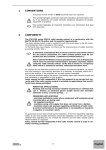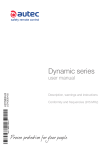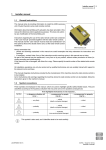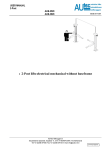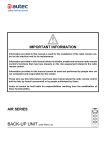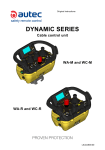Download Manual - IndustryIQ
Transcript
LIE16MU1 1 INDEX AND CONVENTIONS INDEX 1 Index and Conventions 1 2 Introduction to E16 series 2 3 SIRIO E, CONDOR E transmitting unit 5 4 Warnings for use 7 5 Warnings for maintenance 8 6 Operation of SIRIO E, CONDOR E transmitting unit 9 7 Frequencies 11 8 Settings 12 9 SIRIO E, CONDOR E transmitting unit diagnostic 13 CONVENTIONS In this manual, all important information is indicated using the following symbols and conventions: ! abcd. . . : WARNINGS abcd. . . : ISTRUCTIONS abcd. . . : TECHNICAL DATA abcd. . . : IMPORTANT TEXTS Before installing, starting and using the radio remote control, this manual MUST be read and understood carefully by all people who install, use and carry out maintenance on the radio remote control. Follow the indications and warnings given by the machine producer regarding the machine controlled by the radio remote control. If this manual is lost or damaged, ask for a copy from Autec. Please specify the serial number of the relative radio remote control. The information contained in this manual is subject to modification without notice and is not binding. No parts of this manual may be reproduced by any means without the written permission of Autec (Including recording and photocopying). Page 1 ENGLISH Page LIE16MU1 2 INTRODUCTION TO E16 SERIES Industrial radio remote controls of the E16 series are used to command machines from a distance. Each industrial radio remote control is made up of a portable transmitting unit, from which the user can remotely control the machine, and a receiving unit installed on board the machine itself. The transmitting unit uses radio frequencies to transmit a coded message which contains a value called address. Each receiving unit can only decode the messages coming from a transmitting unit with the same address. This excludes the possibility of an interference activating any system function. If the radio frequency transmission is disturbed, incorrect or interrupted, the receiving unit autonomously stops the whole system. Receiving unit Transmitting unit Each E16 series radio remote control is in conformity with the R&TTE 99/05/CE Directive and all its essential requisites. Each radio remote control is also in conformity with the norms given in the EC conformity declaration present in this manual. ! PERMITTED USES: Material lifting machines (construction cranes, industrial bridge cranes, concrete pumps, machines for moving material in general, . . . ) ! FORBIDDEN USES: Machines installed in areas where equipment with explosion-proof characteristics are being used Machines for moving, raising and transporting people To guarantee correct radio remote control operation, all current regulations regarding safety at work and accident prevention should be respected. All current user country national laws regarding the use of both the machine and the radio remote control MUST ALWAYS be respected. Autec cannot be held responsible if the radio remote control is installed on applications that are different from those permitted or if used in working conditions that do not respect prescribed standard. Page 2 LIE16MU1 ! LIMITATIONS & AUTHORISATIONS It should be remembered that in some countries must be respected rules which control: - the use and/or possession of a radio remote control; - the use of operational frequencies which have not yet been harmonised in Europe. ! In any cases of emergencies, faults or damaged parts, ALWAYS stop the “machine + radio remote control” system until the problem has been solved. ENGLISH All the indications that must be observed can be found in the "Limitations & Authorisations" document, which is included in the product’s documentation ! Any damaged parts can ONLY be replaced by authorised Autec personnel, and only using original Autec spare parts. INSTRUCTIONS FOR DOCUMENT MANAGEMENT CERTIFICATE OF GUARANTEE The conditions of the radio remote control guarantee are given in the “Certificate of Guarantee” contained in this manual. The electronic components which have a 3 year guarantee are: E16TXEU_, E16RXEU_ and E16CHEU_. TECHNICAL DATA SHEET The technical data sheet shows the wiring system between the receiving unit and the machine. It should be compiled and checked by the installer, who has the responsibility of correct wiring. Once all necessary checks have taken place the installer must sign the technical data sheet, which must be kept with the user's manual (always keep a copy of this data sheet in case it is needed for administrative purposes). IDENTIFICATION PLATES The radio remote control identification and approval data is given on plates that are on both the transmitting unit and the receiving unit. The plates MUST NOT be removed from where they are placed or damaged otherwise the warranty will be forfeited. Page 3 LIE16MU1 E16 SERIES TECHNICAL DATA Frequency range Programmable radio channel Channel spacing Hamming distance Probability of non-recognition of error Typical working range Working temperature Time of reply to commands Time of reply to STOP Passive emergency time 433.050 ÷434.790 MHz (or 869.7 ÷870 MHz) 32 at 433 MHz (or 12 at 870 MHz) 25kHz ³8 <10 exp-11 100 m -20°C÷+70°C <100 ms <100 ms 1 second (optional 0,5 s) Page 4 LIE16MU1 3 SIRIO E, CONDOR E TRANSMITTING UNIT A SIRIO E, CONDOR E transmitting unit can be used with one of the following receiving units: - Type E16URX - Type E16URQ. The E16 series is equipped with a safety function called SAFETY which protects the "radio remote control + machine" system from involuntary movements caused by possible radio remote control faults. SIRIO E C A F D B H G E A B C D starting keyswitch green signalling LED actuators (joystick and selector) technical data plate E F G H STOP button identification plate START pushbutton battery Page 5 ENGLISH This manual refers exclusively to the transmitting unit: the installation warnings are given in the receiving unit manual. LIE16MU1 CONDOR E C A F D B H G E A B C D starting keyswitch green signalling LED actuators (joystick and selector) technical data plate E F G H STOP button identification plate START selector battery SIRIO E, CONDOR E TRANSMITTING UNIT TECHNICAL DATA NiCd 7,2V - 0,7 Ah or NiMH 7,2V - 1.3 Ah Power supply (battery pack) internal Antenna < 10 mW ERP Transmitting power (frequency 433 MHz) < 5 mW ERP Transmitting power (frequency 870 MHz) nylon (20% fg) Housing IP65 Minimum protection grade 263x160x173 mm Dimensions 1,4 kg Weight ~ 15 hours Autonomy with fully charged battery (at 20°C) ~ 7 minutes Warning of low battery charge Page 6 LIE16MU1 4 WARNINGS FOR USE NEVER LEAVE the transmitting unit unguarded when the starting keyswitch is inserted ! VISUALLY FOLLOW all movements of the machine and its load remaining inside a typical range of action of the machine ! ONLY SWITCH ON OR USE the transmitter unit when starting work: improper use could be hazardous BE POSITIONED in a way that permits him to see the “machine + radio remote control” system, and above all the load, in the best possible way. ! THE OPERATOR MUST ! SWITCH OFF the transmitter unit when work is interrupted. Avoid leaving the load suspended in the air (even when changing the battery) Before using the radio remote control ALWAYS MAKE SURE that the STOP pushbutton can be properly moved ! NEVER SWITCH ON OR USE the transmitter unit in closed spaces, with the machine not in sight, or outside the typical range of action ! ! PRESS immediately the STOP button in case of hazard ! PAY ATTENTION to the entire work area. Press the STOP button in case of hazard Page 7 ENGLISH ! LIE16MU1 5 WARNINGS FOR MAINTENANCE ! ENSURE THAT THE BATTERY HAS BEEN REMOVED FROM THE TRANSMITTING UNIT BEFORE CARRYING OUT ANY MAINTENANCE WORK. ! E C VI R SE Any faults should be repaired by authorised Autec personnel using original Autec spare parts only. No particular maintenance needs to be carried out on the transmitting unit, but the following should be done in order to always keep it reliable and safe: 1) always store the unit in a clean dry place, 2) remove dust or accumulations of other material from the transmitting unit (never use solvents or flammable and corrosive products), 3) make sure that the gaskets, bellows and the actuator hoods (joystick, selectors and pushbuttons) are whole, soft and elastic, and that the symbols on the panel can be seen clearly 4) make sure that the battery seat is always clean 5) make sure that the battery contacts are clean 6) check for signs of damage. SERVICE When it is necessary to carry out special maintenance (radio remote control repair and replacement of damaged or faulty parts), do not contact anyone other than our Assistance Service. In order to make the intervention faster and more reliable, please help us identify the radio remote control correctly and completely by giving: - the serial number - the purchase date (given on the guarantee) - description of the problem found - the address and telephone number of the place where the radio remote control is being used - the name of the person to be contacted - the name of the company that supplied the radio remote control. Before calling the Assistance technicians, it is advisable to make sure that the given instructions have been followed correctly. SCRAPPING When scrapping, entrust the radio remote control to the separate scrap collecting services in the user country. Page 8 LIE16MU1 6 OPERATION OF SIRIO E, CONDOR E TRANSMITTING UNIT LED SIGNALS Fast flash Steady light on starting MEANING OF SIGNAL OPERATION NORMAL LOW BATTERY The transmitter unit switches off approx. 7 minutes after the LED starts flashing ONE OR MORE (movement) ACTUATORS INSERTED POWER AND STARTING To switch on the transmitting unit, insert the starting key and turn it to "I". To start the radio remote control functions, press the “START” (or activate the selector) button or selector for 1÷2 seconds. After starting, the green signalling LED always lights up. ACTION NECESSARY /// Switch off the transmitter unit and replace the battery Release actuator(s) COMMAND ACTIVATION Activate the joystick and/or selector actuators relevant to whatever movement or selection command is to be carried out. STOPPING ! The STOP button should be used when it is necessary to stop the machine immediately in order to check any danger condition. To stop the machine immediately, press the STOP button. To s t a r t w o r k i n g again, turn the STOP button in the direction indicated to deactivate it and repeat the power on and starting procedure. Page 9 ENGLISH TYPE OF SIGNAL Slow flash LIE16MU1 CHARGING THE BATTERY To recharge a flat battery, proceed as follows: 1. Insert the battery into its proper battery charger, which should be positioned in an area having a temperature of between +5°C and +35°C. The battery now starts charging, a state signalled by the lighting up of the “ON CHARGING” pilot light. 2. After a maximum of 4÷5 hours the "END OF CHARGE" indicator switches off: the battery is fully charged. Remove the battery from the charger (if the battery is not removed, charging continues in maintenance mode). SWITCHING OFF The transmitting unit should be switched off each time work is stopped by turning the ignition key to "O" and extracting it (always put the key in a safe place). The unit may also switch off if the battery is not sufficiently charged and/or when the radio remote control is not used for more than 7 minutes. Page 10 LIE16MU1 7 FREQUENCIES The use of 433.050÷434.790 Mhz band frequencies has not yet been harmonised in Europe: check for possible user’s country limitations. Each working radio frequency to which a radio remote control can be programmed belongs to the set of frequencies permitted by national standards that are valid at the moment of entry into the market. Each radio remote control is programmed by the producer in the AUTOMATIC scanning or MANUAL selection mode. AUTOMATIC SCANNING MODE The radio remote control is usually programmed by the manufacturer in this mode: it can therefore work in any of the available frequencies. In cases of interference or conflict with other systems, this mode makes it possible to move the working frequency (see the process explained below) without having to intervene inside either the transmitting or the receiving units. Working frequency change process 1 With the transmitter unit ON (flashing green LED), press the STOP button. 2 Within 4 seconds after the STOP button has been pressed, press the START pushbutton (or the selector) then release it. 3 Turn the STOP button in the direction indicated and repeat the power on and starting procedure. N.B.: During the work frequency changing process, the receiving unit loses radioelectric connection with the transmitting unit. After starting, some seconds may be necessary to reset connection, therefore keep the START button pressed for about 8÷10 seconds. MANUAL SELECTION MODE A radio remote control operating in MANUAL selection mode can operate at a specific frequency. In order to set the frequency selected the dip switch on the transmitter and receiver units must be set. To activate this means of operation contact authorisedAutec personnel. Page 11 ENGLISH ! WORKING FREQUENCIES LIE16MU1 8 SETTINGS DIP SWITCH ON RADIO MODULE The eight dip switches on the transmitter module are for programming various functions and setting the operating frequency. ! The dip switches must be programmed with the battery removed from the transmitting unit and can be done only by authorised personnel. OFF The transmitter unit switched on without commands entered switches off after 7 minutes Activation of low battery warning from horn on machine Automatic selection and scanning of frequencies (DIP 3 ÷ DIP 7 OFF) DIP 1 ON The transmitter unit never switches off automatically Low battery warning from horn on machine deactivated Manual selection of frequencies (DIP 3 ÷ DIP 7 as table) 2 8 869.7÷870 MHz 12 frequencies available 433.050÷434.790 MHz 32 frequencies available DIP SWITCH MHz DIP SWITCH MHz 3 4 5 6 7 8 433.075 433.100 OFF OFF OFF OFF OFF ON ON OFF OFF OFF OFF ON 433.975 434.000 433.150 OFF OFF OFF ON OFF ON 434.050 ON ON OFF OFF OFF ON 434.075 OFF OFF ON 433.275 OFF OFF OFF OFF ON ON 433.300 ON OFF ON OFF OFF ON 434.175 434.200 433.175 ON 433.350 433.375 OFF OFF OFF ON 433.525 OFF ON OFF OFF OFF ON 433.550 433.650 ON ON ON ON ON OFF OFF ON MHz 3 4 5 6 7 8 434.250 434.275 ON OFF OFF OFF ON ON OFF OFF ON OFF OFF ON DIP SWITCH 3 4 5 6 7 8 869.7125 OFF 869.7375 OFF OFF OFF OFF OFF ON OFF OFF ON OFF ON 869.7375 OFF OFF OFF ON ON OFF ON 869.7625 OFF OFF OFF OFF ON ON ON OFF ON OFF ON ON 869.7875 OFF ON OFF OFF OFF ON OFF OFF ON OFF ON ON 869.8125 OFF ON OFF ON ON 869.8125 OFF ON OFF ON OFF ON ON OFF OFF ON ON ON ON ON 869.8375 869.8625 OFF ON OFF OFF ON ON ON OFF OFF ON 869.8875 OFF OFF ON ON 869.8875 869.9125 OFF OFF ON 869.9375 OFF ON ON ON OFF OFF ON ON ON ON OFF OFF ON OFF ON 434.425 434.450 OFF ON OFF ON OFF ON OFF ON 434.550 ON ON OFF ON ON ON OFF OFF ON ON OFF ON ON ON ON ON ON ON OFF OFF ON OFF OFF ON ON ON ON OFF ON ON OFF ON OFF ON 434.575 OFF ON 433.725 OFF ON OFF OFF ON ON 434.625 ON OFF ON 433.750 ON OFF ON ON OFF ON 434.650 OFF ON ON OFF ON ON 869.9625 OFF ON ON ON 434.750 434.775 ON ON ON ON ON 869.9625 OFF ON ON ON OFF ON OFF ON ON ON ON ON 869.9875 OFF ON ON OFF ON 433.675 433.850 433.875 ON OFF ON OFF ON ON ON ON ON ON ON OFF ON ON ON ON OFF ON ON ON ON ON OFF OFF ON OFF ON ON ON OFF OFF ON ON ON ON Page 12 LIE16MU1 9 TRANSMITTING UNIT DIAGNOSTIC If you activate START, is the led on with a steady light? YES Is the STOP button or one of the movement actuator inserted? Release it/them Is the led on with a steady light? NO Does the led blink quickly ? NO YES NO Does the led blink slowly ? YES The battery is discharged: replace it with one that is charged. Does it continue to blink quickly? NO YES YES Clean the contacts in the battery seat. Does it continue to blink quickly? YES NO Carry out diagnostics checks on the receiver unit. NO If the problem persists CALL TECHNICAL ASSISTANCE Page 13 ENGLISH If the “machine+radio remote control” system does not start, check if the problem is caused by the radio remote control or the machine. Before carrying out any verifications, check the functioning of the machine with the cable control panel: - if it does not switch on, the problem lies with the machine itself - if it does switch on, the problem lies with the radio remote control. In this case, proceed as follows:














